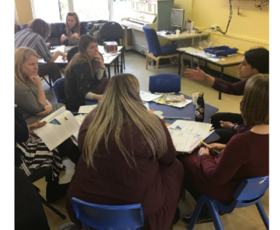Mastery Readiness
Mastery Readiness
| Type: Work Group | For: Teachers and Maths Leads |
| Time: 6 half days + school visits | Cost: free of charge |
Mastery Readiness is the first year of a four-year journey for schools to develop the vital skills and practices to build a sustainable, mastery approach to mathematics teaching and learning.
Mastery Readiness Focus
Developing effective leadership to remove barriers and put in place structures to support change and teacher professional development
Developing classroom culture and attitudes to mathematics that will support a teaching for mastery approach, both on the part of teachers and their pupils
Work Group Expectations
During each half term, participating teachers are required to:
Attend a work group session, led by an NCETM trained Mastery Readiness Lead. Head teachers are expected to attend relevant sessions.
Participate in a 1:1, half-day visit to your school, by your Mastery Readiness Lead to work on a bespoke action plan, which aligns to your school’s current priorities.
Work Group Outcomes
Professional Learning
- Teachers and leaders explore and evaluate their current systems, cultures and professional development structures within their setting
- Teachers and leaders understand how the Catalysts for Change are designed to lay firm foundations for the development of teaching for mastery and how these can be implemented in school
Practice Development
Schools:
- implement some of the Catalysts for Change by identifying an action plan of key areas of priorities for them
- develop a shared vision for what maths will look like in their school, including the active development of positive mindsets for all pupils and staff
All teachers try new approaches to teaching maths and will reflect on the impact of their changes regularly so that they can share good practice beyond their own classroom.
Leaders ensure professional development practices are in place so that the cycle of change can be implemented.
Whole School Policies and Approaches
Leaders reflect upon current whole school policies and systems and individual classroom practice and prioritise actions
Schools:
- promote a collaborative learning culture amongst staff in order to make improvements to the teaching and learning of maths
- develop a shared vision for what maths will look like in their school to include the active development of positive mindsets for all pupils and staff
Pupil outcomes
- Pupils demonstrate an improved mathematical mindset and potential to progress in the subject
- Pupils demonstrate an improvement in arithmetical proficiency
if you have any further questions please contact:



